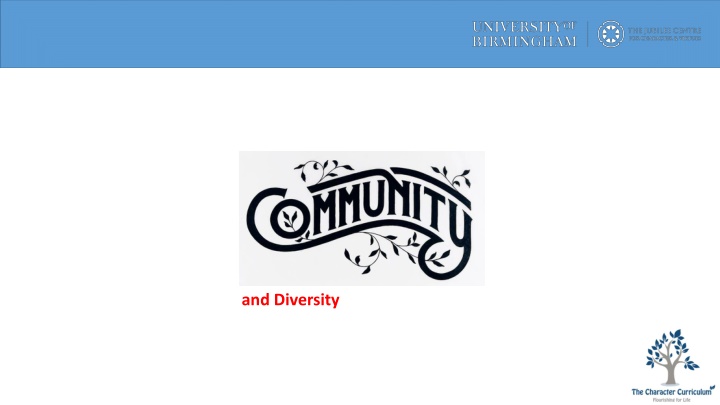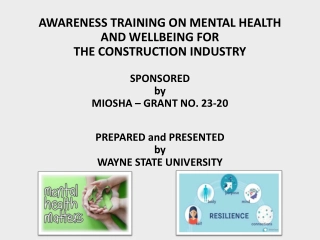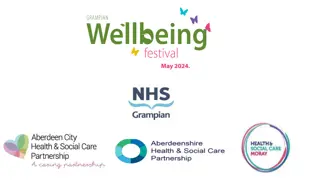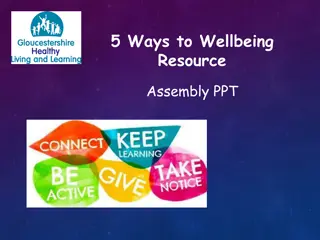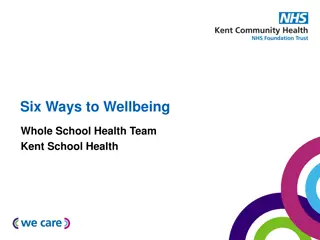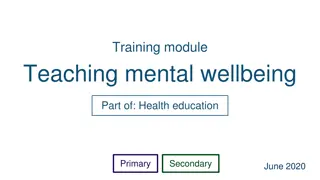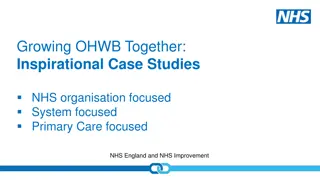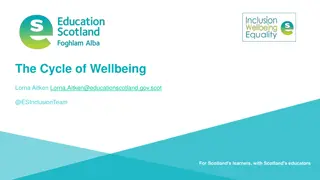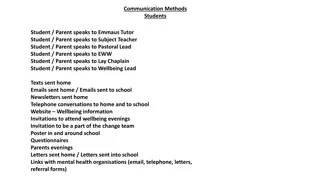Responding to Mental Health and Wellbeing through Creative Practices
Engage critically with debates on mental health and wellbeing agenda in adult community learning, emphasizing creative provision. Explore the role of creative practices in promoting mental health recovery and wellbeing, based on research into participatory arts initiatives. Highlight the importance of community outreach in sharing effective strategies.
Download Presentation

Please find below an Image/Link to download the presentation.
The content on the website is provided AS IS for your information and personal use only. It may not be sold, licensed, or shared on other websites without obtaining consent from the author.If you encounter any issues during the download, it is possible that the publisher has removed the file from their server.
You are allowed to download the files provided on this website for personal or commercial use, subject to the condition that they are used lawfully. All files are the property of their respective owners.
The content on the website is provided AS IS for your information and personal use only. It may not be sold, licensed, or shared on other websites without obtaining consent from the author.
E N D
Presentation Transcript
Using the key word sheet match the correct definitions and descriptions to introduce your self to the language of diversity.
Diversity Society today is made up of people from diverse backgrounds and different walks of life. 1. Make a list of all the different types of people that make up your community. Now thinking about those different types of people and answer the following questions: What are the benefits of living in a diverse society? Are there any tensions? What virtues could you use in order to thrive in a diverse community? How does being a part of a community grow your character in positive ways? 2.
Case Study People who suffer inequality often have to display character in order to achieve their goals. Read through the examples on your sheet. Why might this person suffer from inequality or be discriminated against? Identify what character traits the characters in your case study would have to display?
My names Excellence and Im 13. I just moved here from Nigeria. My dad is Nigerian and my mum was born in the UK. I m starting at The Charter School after half term. I like watching TV and playing with my baby sister. My name is Anna. I use a wheelchair. I m 31 years old and I m a swimmer in the Paralympics. I started swimming when I was 5 and my boyfriend s also a Paralympic swimmer too. My name s Oliver. I m gay and I live in London with my boyfriend. I m 35. I work at a book publishing company and I like going to the cinema and meeting my friends after a long day at work. My name is Aileen. I m 81 years old. I live in a flat on my own. I used to be a teacher and I still like to read books. I socialise with other men and women my age. I go to Brixton market on the bus to buy my fruit and vegetables for the week. I love cooking! My name s Mamraj and I m 15. My parents moved here from India before I was born. My brother and sister and I go to school in Southwark. My mum and dad both work at St Thomas Hospital. My favourite subjects are art and geography. My name is Simon. I go to a school which is especially for people like me, who have autism. I like spending time on my own though, I ve got lots of hobbies and I love reading.
Moral Dilemma What would you do if you were in John s shoes? Have you ever been there? Do you regret or are you proud of your decision now? Have you ever been told on by someone because you were doing something wrong? What was your immediate reaction? What do you remember about how you felt about your behaviour at the time?
Role models Nelson Mandela was born on 18th July 1918 in South Africa. His father died when he was 9, and he was the first member of his family who was sent to school. In 1941 he was expelled from university because he led a group of students on a political strike. Mandela was sent to prison for life in 1962 for protesting against poverty, inequality and racism against black people in South Africa during the apartheid. The apartheid was when people were divided by their race and forced to live separate lives. Black people could not do the same things as white people, such as going to certain places or voting. Mandela stayed in prison for 27 years of his life until 1990, when there was greater political freedom in South Africa and he was set free. He received the Nobel Peace Prize in 1993 and in 1994 he was elected as the first black South African president. 1. Read the story of Nelson Mandela, watch the film of his life and discuss how he displayed character in his story of the fight against injustice in his community. 2. Write a journal entry describing your feelings about Nelson Mandela s story and use your discussion and questions to help frame your piece.
